This week wraps up the end of National Children’s Dental Health Month and we’ve spent the month educating parents about ways to improve upon their children’s dental health. Today we’ve collected 5 of our best dental tips for kids that every parent needs to know. So let’s get started!
Best Dental Tips for Kids
Tip #1: KIDS SHOULD SEE THE DENTIST FOR THE FIRST TIME BY AGE 1.
The American Academy of Pediatric Dentistry, American Dental Association, and American Academy of Pediatrics ALL recommend that every child see a dentist by age 1. When does 1+1 = 0? One tooth + One visit to the dentist = No cavities. We chose this tip as the first one because it is the most commonly asked question of dentists by new parents. In our opinion, it’s never too early to bring your child in and let them begin getting comfortable. The more they come with you and see what you’re doing the more comfortable they will be!
There is no such thing as a child too young to deserve good oral health.
Tip #2: A CHILD’S FIRST DENTAL VISIT SHOULD BE FOR FUN AND EDUCATION.
We strive to make a child’s first dental appointment fun and educational. It’s all about a positive experience to develop comfort and trust, as well as learn from the parents what habits/behaviors are exercised at home. When your child is ready, we assess their teeth, practice hygiene in the office, discuss home care, and set a recall schedule. We will also work with your pediatrician or make referrals to a pediatric dentist as appropriate. It’s usually not a “good” initial visit when a parent brings a child in for the first time who has a tooth that hurts because of a large cavity they have to have filled. That understandably makes the child not-so-thrilled to return to the dentist! This can be avoided by regular 6 month appointments scheduled beginning at age 1 that are fun and help your child grow to be comfortable with the dentist (he’s not so bad, really).
5 Best Dental Tips for Kids
Tip #3: KIDS SHOULD BRUSH INDEPENDENTLY BY 6 AND FLOSS BY 10.
An appropriate target age for brushing independently is around age 6. A good indicator for this is around the same time a child learns to tie their shoes or are finishing kindergarten. Flossing takes a little longer. Most kids shouldn’t floss without the help of a parent until around age 10. It’s important to teach kids how to brush and floss independently, but it’s just as important that, as parents, we make sure they are doing what it takes to adequately clean their teeth and gums.
Sometimes brushing and flossing can be a chore so we’ve created a really fun teeth brushing chart for kids! It covers a week’s worth of brushing twice a day and flossing once a day. If the child completes the chart you can give them reward! It’s a really healthy game that creates great habits for the future! Make it green by laminating it, and using it over and over.
Tip #4: SEALANTS FOR KIDS HELP PREVENT CAVITIES IN THE PITS OF MOLARS.
We frequently seal first (6-year) and second (12-year) molars to prevent the often-deep pits and fissures from harboring cavity-causing bacteria. We typically roughen the surface of the pits and grooves and paint a thin layer of sealer into the groove to protect the tooth. This won’t stop a cavity, but it does a lot to prevent one from forming! This is a quick and easy procedure and kids won’t even know the sealant is there! “An ounce of prevention is worth a pound of cure.”
National Children’s Dental Health Month #NCDHM
Tip #5: YOUR CHILD’S DIET CAN DETERMINE THE HEALTH OF HIS/HER TEETH.
Calcium is very important in the formation of strong teeth. Most 8-14 year olds don’t get enough of it in their diet! Milk and cheeses are the easy way, but if your young ones don’t consume dairy, consider almonds, white/red beans or even oranges. A daily multivitamin, which you choose with the help of your child’s pediatrician, may also be beneficial. In addition to creating a strong foundation for you children’s teeth, it’s also important to avoid food and drinks that are acidic or full of sugar.
Remember, your kids will learn their eating habits from you! Set a good example by eating a healthy, varied diet and always brush and floss your own teeth. It’s good for your kids and good for your own journey toward whole body wellness!
Thanks for taking the time to read our five favorite children’s dental tips! We hope they helped clear up some questions and/or concerns! We are always around to answer additional questions. Just leave a comment below, call or come in, or check out our Facebook Page! Also, don’t forget to check out our recent post, “Children’s Dental Tips – The Basics.”

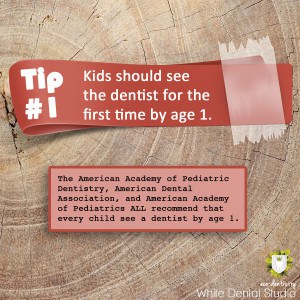
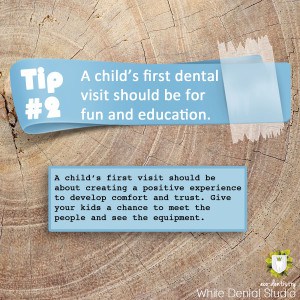
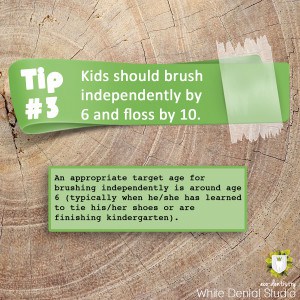
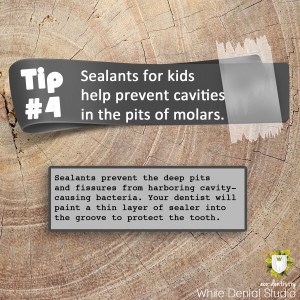
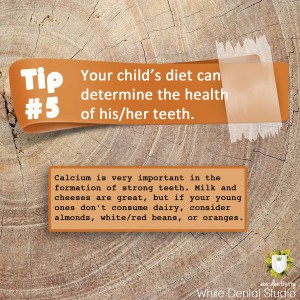
I really like tip number 2 that your child’s first visit should be for fun and education. It seems like a lot of kids are afraid of the dentist. Doing this would be a great idea to help take that fear away.
I guess we’re a bit late for visiting the dentist for the first time. Our sons a little over 2 years old and we’ve been trying to get him off his sugar craze. Whenever we don’t give him anything sugary he throws a tantrum. I’m not sure where he’s getting that behavior, but we’re sure not encouraging it. I just hope that we grows out of it and starts eating better like the rest of the family.
I can also agree that the second tip is a really good one. It’s always sad to me to see a child that’s afraid of going to the dentist. We need to show them that it’s really not all that bad! Setting up a dental visit that’s supposed to be fun and educational sounds like it’d be a pretty good way to accomplish that.
I have always loved going to the dentist. Ever since I was little, I have really liked going. I think it was because of the environment. These tips should help me with my children. Right now they are too young, but I want to make sure that they have the same positive experience at the dentist office as I did. It really helps because they will be able to take care of their teeth better and understand why they need to.
Thank you for these tips. My child is almost old enough to see the dentist. I want her experience to be good, so that going to the dentist isn’t scary for her. I like what you said about how you strive to make a child’s first dental appointment fun and educational. That’s the kind of experience I want for my daughter.
I really agree with your third tip. Children should be able to brush their own teeth. My children have even worked hard to brush on their own before then. My son had the determination to become a ‘big boy’ and brush on his own.
I never really thought about number two before. Kids are probably pretty nervous about their first visit to the dentist. If you can manage to take them in to talk with a dentist and the technicians before they actually need any work done, then they would probably feel so much better about it.
The first tip does have two reasons behind it. The sooner you go, the more used to it, and comfortable the child will be, as said above. I made sure that the dentist would be easier for the child to go to.
I had no idea that you use sealants to help with so many kids. I think it’s a great idea to help prevent deep pits from forming. My oldest daughter is about to turn six so I wonder if our dentist will do something like this for her. I’ll have to ask him about it the next time we go in! I think it would really help!
All five of these tips are brilliant! Dental care for kids can be pretty complicated, but you made it much easier to comprehend. I really like what you said about making the first dentist trip fun. Going to the dentist for the first time can be pretty intimidating. You have to show them that they don’t have anything to be scared of. Thank goodness there are so many good dentists out there that can make the process easier. Thanks for the post!
That sounds like a good timeline to have kids know how to brush their teeth by themselves by the time they are six. I agree that flossing might take a bit longer, but that’s okay. As long as they develop those good oral hygiene habits, it’s worth the time invested. I wonder if that chart would help my kids get into it.
Let us know! We love seeing pictures of kids and their finished brushing/flossing charts on our Facebook page! http://www.facebook.com/mywhitedental
Tip number three is interesting. I taught my kid how to independently brush and floss younger than both those ages. I haven’t thought of it to be a bad thing.
Nor do we! If a parent responsibly monitors a child’s brushing and flossing and they are able to do see at a younger age, then way to go! Thanks for the comment.
The information about preventing cavities in the pits of molars in Tip #4 was very interesting. I didn’t know that dentists can use sealants for first and second molars to prevent pits and fissures in teeth from forming cavities. How do dentists roughen the surface of pits and grooves in teeth to paint a layer of sealer? I might consider having my child’s molar’s sealed, but it’s important to me to know more about what’s involved with this procedure.
We use a tiny attachment to our handpiece to roughen and remove several microns of surface enamel and any stain which could be related to the start of a cavity in the pits and grooves before placing the sealant material. This also helps the sealant to have a more firm attachment with the tooth.
Wow, I had no idea that most dentists should see a kid by the time they are one year old! Now that I know that, though, I’ll be sure to find a dentist that can take a look at my daughter’s teeth. She’s 16 months old and her teeth look fine, but I want to make sure that there are no problems. It’s better to be safe rather than sorry!
Thanks for the information. Like Deanna said, I like your tip about how to prevent cavities; I wish I had known that before all of my children started getting cavities! We’re going to make sure we follow your tip about seeing a dentist to have the teeth roughened. Is it safe to do that?
This is awesome! Keep up the posts!
The tip to first that your kid in for a fun/educational purpose is such a good idea. That way, they don’t associate tooth pain with having to go to the dentist. So when you go for checkups they won’t be scared.